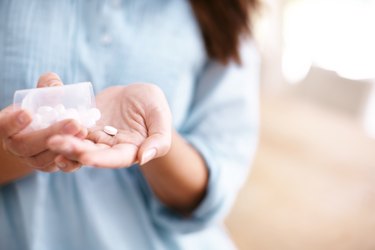
Biotin has emerged as one of the most popular dietary supplements for healthy skin, hair and nails. Also known as vitamin B7 or coenzyme R, it reduces hair loss and supports metabolic health. While the benefits of biotin are well-known, few people are aware of its side effects, such as mild nausea and increased thirst.
However, doses of up to up to 10 milligrams a day are safe, according to Mayo Clinic. As long as you do not take more than two servings of biotin 5,000 mcg per day, you are unlikely to experience adverse reactions.
Video of the Day
Video of the Day
Biotin 5,000 Mcg Side Effects
Many biotin vitamins available on the market provide around 5,000 micrograms of this nutrient per serving. If you take large doses, the excess will be eliminated through urine. This means it's impossible to have too much biotin in your system. However, there are some potential side effects you should be aware of.
First of all, this nutrient may cause falsely low or falsely high thyroid test results when consumed in excess. Additionally, biotin vitamins can interact with olanzapine, clozapine, azithromycin, roxithromycin and other drugs. If you're taking any medications, consult a doctor before supplementing your diet with biotin.
In rare cases, biotin may cause upset stomach, mild nausea, diarrhea and skin rashes. The best way to prevent these side effects is to take your supplements with food.
Extreme adverse reactions are rare. An older person who took biotin in combination with vitamin B5 for two months developed eosinophilic pleuropericardial effusion, a life-threatening disease. Researchers are unsure whether biotin or something else caused this problem.
Biotin 5,000 mcg side effects may also include increased thirst and insomnia. Unlike other supplements, this nutrient does not cause weight gain, constipation or digestive problems. However, allergic reactions may occur.
What Is Biotin?
The human body needs this water-soluble vitamin to convert protein, fats, carbs and other nutrients into energy. Biotin occurs naturally in certain foods, but it's also available in supplement form. Since it cannot be synthesized by your cells, it must be obtained through diet.
Beef liver, meat, egg yolks, salmon, dairy, yeast, avocado and sweet potatoes are among the best dietary sources of biotin. People who are struggling with hair loss, brittle nails and certain skin conditions often take supplements containing biotin. These products are also recommended during pregnancy when this vitamin is required for normal fetal development.
How much biotin you need on a daily basis depends on your age and overall health. According to the Office of Dietary Supplements (ODS), adults over 19 years old should get approximately 30 micrograms per day. Nursing mothers need at least 35 micrograms of biotin daily.
The Health Benefits of Biotin
Biotin is typically recommended to those with biotin deficiency, hair loss, mild depression and seborrheic dermatitis. It's also prescribed during pregnancy and lactation. According to a study published in The Journal of Nutritional Biochemistry in 2013, biotin increases insulin secretion and improves glucose tolerance. Therefore, it may help in diabetes prevention and management.
A 2016 study in Neuropharmacology indicates that biotin may help limit or reverse multiple sclerosis-related symptoms. These benefits are due to its ability to increase energy production and fatty acid synthesis.
A 2015 review in the Canadian Journal of Physiology and Pharmacology notes that biotin exhibits anti-inflammatory and immune-boosting properties. Therefore, it strengthens your natural defenses and protects against various diseases. Arthritis pain, for example, is often due to inflammation, so a biotin-rich diet may help relieve your symptoms.
Now that you know how biotin benefits your health, get more of this nutrient into your diet. Supplements can help, too. You may experience faster hair growth, greater energy and enhanced mental focus. Since 5,000 micrograms is a high dose, check with your doctor before taking this supplement.
- NIH Office of Dietary Supplements (ODS): Biotin
- Mayo Clinic: Biotin Side Effects
- RX List: Biotin
- The New England Journal of Medicine: Biotin Treatment Mimicking Graves’ Disease
- Peace Health: Biotin Interactions
- The Journal of Nutritional Biochemistry: Effects of Biotin Supplementation in the Diet on Insulin Secretion, Islet Gene Expression, Glucose Homeostasis and Beta-Cell Proportion
- NCBI: Targeting Demyelination and Virtual Hypoxia with High-Dose Biotin as a Treatment for Progressive Multiple Sclerosis
- Cleveland Clinic: Is Biotin as Good as Advertised for Your Hair Loss?
- European Food Safety Authority: Biotin and Contribution to Normal Energy-Yielding Metabolism
- Bustle: 7 Unexpected Dangerous Side Effects Of Taking Biotin
- eHealthMe: Biotin and Excessive Thirst - From FDA Reports
- eHealthMe: Biotin and Insomnia - From FDA Reports
- Medical News Today: Why Do We Need Biotin, or Vitamin B7?
- NCBI: Effect and Treatment of Chronic Pain in Inflammatory Arthritis
- Fast Med: Biotin Side Effects